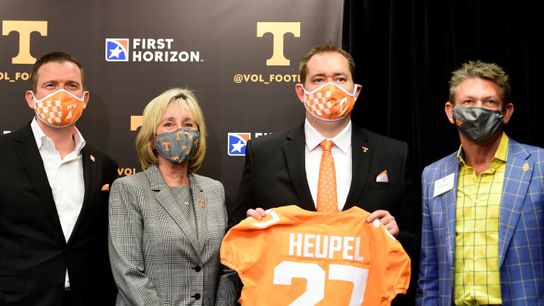The University of Tennessee is standing toe-to-toe with the NCAA – at least as it pertains to its internal investigation into the misdeeds of disgraced and fired former head coach, Jeremy Pruitt.
Thursday afternoon, UT officials released a statement that emphasized the school will not self-impose a postseason – bowl – ban though the school did not specify what sanctions it intends to impose upon itself for what University of Tennessee Chancellor Dr. Donde Plowman the school's investigation “indicates serious violations of NCAA rules.”
This move, however, reflects UT's commitment that at 4-4 and with four games left on its regular-season slate in Josh Heupel's first season at the helm, Tennessee is two wins from a potential postseason berth – and Danny White's athletics department intends to accept a postseason invitation if the Vols qualify.
“The university has completed its investigation of rules violations with the football program,” UT said in a statement. “We are moving forward with our focus on rebuilding our football program and supporting student-athletes.
“We will now work to finalize a fair and efficient resolution through the applicable process while navigating a rapidly changing landscape in intercollegiate athletics that includes transformative change for the NCAA, the Alston (United States Supreme Court decision that ruled against the NCAA) and significant new name, image and likeness rights for our student-athletes. …
“In the interest of protecting rights of innocent student-athletes, the university will not impose a postseason bowl ban.”
This element was key for White, hired in January after UT parted ways with former 1998 1998 national championship-winning coach and then-A.D. Phillip Fulmer.
Per sources, White fought extremely hard against any movement to self-impose a bowl ban. No coaches remain from Pruitt's staff. Almost no staff anywhere in athletics from that time remains – particularly as it pertained to those staff members who had direct involvement with Pruitt's program.
UT will administer some of its own penalties, per sources. Look for both some potential scholarship reductions and additional off-the-field measures to be imposed by UT, mostly targeted at recruiting elements. Tennessee officials could reduce official visits, coaches’ time out on the road for visits, and other similar potential penalties, per an individual who previously has dealt with self-imposed NCAA sanctions.
UT said in its statement that it cannot at this time comment further on the NCAA process.
Key to emphasize is that this is the University of Tennessee's stance. It does not obligate the NCAA in any way to accept UT’s own punishments. UT simply hopes that it does.
Oklahoma State hoops, for example, publicly blasted the NCAA this week because the NCAA just issued a postseason ban in Cowboys' men's basketball for 2021-22, after the school had terminated the coach involved and had asked that it not be barred from postseason competition. That was the first domino in that FBI basketball probe that also involves Auburn, LSU and Kansas, among others.
Pruitt last month threatened suit against UT, via his attorney, as Pruitt has sought to recoup some of the approximately $12 million that he has been denied after UT said that it had fired Pruitt "with cause."
Pruitt had established an Oct. 29 deadline for UT officials to respond to his letter, but sources this week told FootballScoop that UT had not responded to Pruitt's letter, which was leaked to the public.
In another interesting University of Tennessee move from Thursday, the school presently is installing metal detectors outside of Neyland Stadium – specifically around the gates most often used by students, Gates 4 and 23 – per sources.
The move by the university is in direct response to the Vols' last home game, when fans – predominantly in the southeast corner of the stadium – peppered the field with debris and trash in a chaotic scene that prompted a 20-minute delay in Tennessee's eventual 31-26 loss to Ole Miss.
Tennessee also was fined $250,000 by the SEC in the wake of that incident.
The school said at the time, in statements from both Plowman and White, that it would seek to punish transgressors and also make changes for future contests.
The installation of metal detectors, per sources, is the first step in that process.
